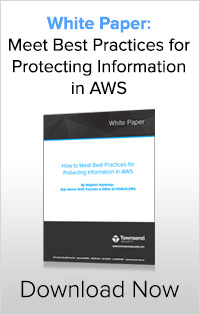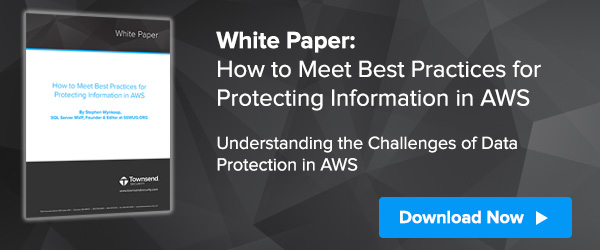One of the most frequent questions I receive about encryption in the AWS cloud is “Who owns the encryption keys in the cloud?” and “Does Amazon have access to my keys?” I understand why this is a confusing question. I also understand why the question is important to many Enterprise customers. Cloud service providers don’t like to talk about this very much, so let’s spend some time running this to ground. We’ll start with the question about Amazon’s access to your encryption keys.
 Amazon Web Services provides two encryption key management options:
Amazon Web Services provides two encryption key management options:
- AWS Cloud HSM
- AWS Key Management Service (KMS)
The answer to the question of key ownership depends on which service you are using. Let’s deal with the easy one first.
The AWS Cloud HSM is a physical hardware security module (HSM) that is dedicated to you. It is physically located in an AWS regional cloud data center, but only you have administrative access to the key server. Amazon is clear on the topic of encryption key ownership with the Cloud HSM service: Only you have access to the keys. Of course, Amazon has physical access to the HSM in their data center, but I think we can trust Amazon’s claim that only you have access to the actual encryption keys in a Cloud HSM server.
Now let’s turn our attention to the AWS Key Management Service, or KMS. This is a multi-tenant service provided by Amazon which is backed by an Amazon hardware security module. That is, Amazon creates a key that is only used by you, but that key is protected (encrypted) by an Amazon managed HSM. When you create a key in KMS it is called a Customer Master Key, or CMK. The CMK is actually a data structure that contains your symmetric key and meta data about the key. The CMK is protected by an Amazon HSM key. So, the answer to the question about who owns your key is straight-forward: You and Amazon share ownership of the encryption key and that ownership is equal. You both can access the raw encryption key.
Recently Amazon introduced a new “Bring Your Own Key” option for the KMS service. Does this change anything about who has access to the key? No, you are bringing your own encryption key and loading it into the AWS KMS service as a part of a CMK, but it is still protected in the KMS service by an Amazon HSM key. This means that you and Amazon share equal ownership of the key and both of you have access to the key. The only difference with Bring Your Own Key is that you retain the actual value of the encryption key outside of the AWS cloud.
So, to summarize: The AWS Cloud HSM service provides dedicated encryption keys that only you have access to. The AWS Key Management Service provides encryption keys and both you and Amazon have access to the key.
So, why is this important? Here are some comments that Enterprise customers have shared with me:
In almost every country both law enforcement and national security agencies have legal means to compel a cloud service provider to surrender data related to cloud customers. Certainly in the US this is the case, and it is true in most other countries. In the US it is additionally true that law enforcement and national security agencies may access this information and prohibit the cloud service provider from notifying you – the customer – that access has been granted. Cloud service providers like Amazon and others naturally abide by the laws of the countries in which they operate. But this means that your encryption keys in AWS KMS can be surrendered without your knowledge. You may not like this aspect of your country’s legal system, but it is a fact of life.
Why is this of concern to Enterprise customers? It is because significant law enforcement or intelligence service activity concerning your employees or customers may take place without your knowledge. If you are an executive in a large Enterprise you really want to know if there are potential problems in your workforce, or significant problems with a customer or service provider. Questions like these might arise:
- Do I have an employee engaging in illegal activity?
- Do I have multiple employees colluding together to engage in illegal activity?
- Is one of my customers engaging in criminal activity that may compromise my business?
- Are there managers in my organization that are breaking the law?
- Is there some activity that may significantly damage my business reputation?
- How can I deal with a problem if I don’t know about it?
When your IT systems are physically located in your data center law enforcement and intelligence agencies have to contact you to get access to data. That is not the case in the cloud – you will be in the dark in many cases.
In my experience Enterprise customers will cooperate with their legal requirement to provide data to law enforcement. This is not a question of cooperating with legal requirements to surrender data in a criminal investigation. But Enterprise customers really want to know when significant legal events take place that affect their organizations.
The critical concern is visibility of law enforcement and intelligence service activity that affects you. For this reason many Enterprise customers will not use the AWS Key Management Service. And because they do not have physical access to the Amazon Cloud HSM devices, they will not use this dedicated encryption key management service either.
I hope this clarifies some of the issues related to the Amazon key management options. Of course, these issues are not exclusive to Amazon, the same issues are relevant to the Microsoft, IBM and Google cloud platforms. There are good alternative options to cloud encryption key management services and we will cover those in a separate blog.
Patrick

